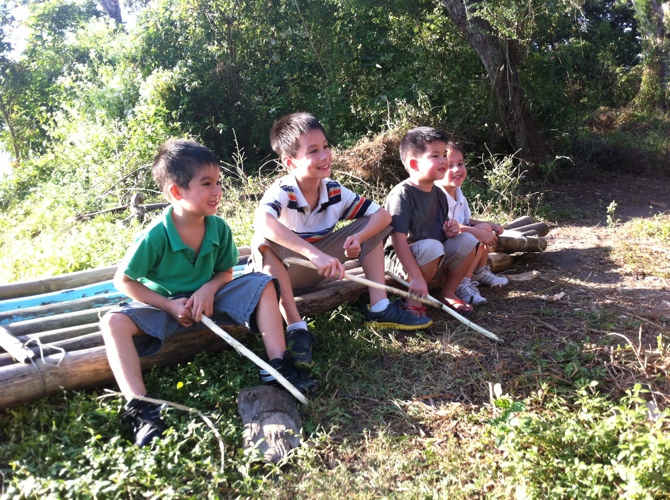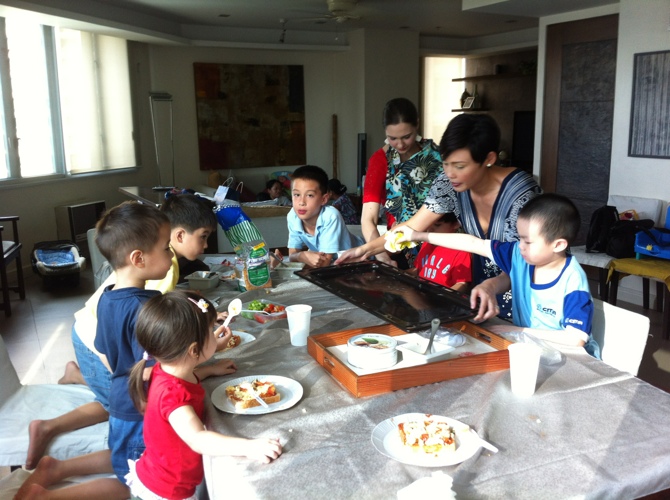A majority of the time, homeschool kids are not weirdos who can’t relate well to children their age. But, I do believe parents have to give their kids opportunities to interact with and learn along-side other children because there are some very important benefits of social interaction.
They don’t NEED to be with their peers on a daily basis to have a learning advantage but they can learn how to cooperate, share, wait their turn, imitate positive behavior, listen to instructions delivered by other adults or older children, respect other people’s property and things, mind their manners, apply contentment, encourage one another, assist others and share the gospel…to name a few.
Personally, one of the reasons why I like to get the kids out and about is this: I get to observe facets of their personalities, commend good character and identify areas of improvement. So Edric and I give our children varied and diverse social experiences as part of their homeschooling.
For our little brood, Edric and I do the following: We let our kids hang out with their cousins often. They attend regular music classes, sports activities and weekly playgroups. As often as possible, they also accompany Edric and I to our activities where they learn to communicate with adults and behave in socially appropriate ways like not picking their noses, speaking too loudly, or saying excuse me when they need our attention.
Thankfully, cooped up at home does not describe our children (and most homeschoolers). But, allowing our children to have lots of social interaction has its “risks.”
Our kids do encounter negative peer pressure and “undesirable” examples in other children or grown-ups. The key, however, is that we come alongside them to help them process and identify how to respond to the behavior they see in others. Most of the time, they are pretty open and will ask their questions. And our kids, like all other kids in the world, are not impervious to negative peer pressure. But we try to disciple and mentor them, so they have a fighting chance against it.
Yesterday my boys came up to me chuckling and partially embarrassed as they told me that they had a classmate in Taekwondo who was calling other students “Booby and Boobs.” Yet another classmate was saying “Barbie-butt.” (I don’t even know what that means.) Granted, these terms are not as bad as hearing elementary-aged children cussing.
My boys started cracking up as they told me this and I tried to be calm. “Do you know what boobs are?” I asked my boys. They explained. And I said, “Well, that is a private part and you don’t need to say the same things your friends do when it is not appropriate.”
“Yah, we know.” They also revealed that one of their good friends called booby-boobs friend “evil witch!”
“Well, that wasn’t nice either.”
I asked them, “What is our guideline for the words we speak? They must be glorifying to…” And they finished the sentence with,”God!”
I have already come to accept that homeschooling cannot bubble-wrap protect my kids from the world. And homeschoolers aren’t a perfect breed of children who always behave and act in the ways they should. (This includes my own.)
Like all other kids, homeschoolers need parents to spiritually mentor them and shape their character so they are equipped to stand for what they believe. Edric and I don’t always get it right but we are committed to do the following:
— First, we introduce our kids to Jesus Christ and trust in the transforming work of the Spirit of the Lord. “Jesus is the author and perfecter of faith.” (Hebrews 12:2a)
— Next, we build bridges to the hearts of our kids by spending lots of time with them and communicating to them that they are loved, precious, and special to us.
— We train our children so they develop essential character traits — the foremost of these is obedience. (Proverbs 22:6)
— We pass on faith and what it means to love God, seek him and live for him. (Deuteronomy 6:4-7)
— We tell them that God has a plan for their lives and a purpose that is unique to their gifts, abilities, and personalities. (Jeremiah 29:11)
— We teach them to reject sin while loving the sinful and the broken to Jesus. The Bible tells us, “Let love be without hypocrisy. Abhor what is evil; cling to what is good. Be devoted to one another in brotherly love; give preference to one another in honor…” (Romans 12:9, 10 NASB)
— We equip them with social graces to convey respect and appreciation for cultural, societal, and racial differences in people because God loves all people and we should to. 2 Peter 3:9 tells us that God desires for all to come to repentance.
— We give them guidelines for choosing the right friends –friends who are wise and share the same biblical values.

“How blessed is the man who does not walk in the counsel of the wicked, nor stand in the path of sinners, nor sit in the seat of scoffers! But his delight is in the law of the Lord, and in His law he meditates day and night. He will be like a tree firmly planted by streams of water, which yields its fruit in its season and its leaf does not wither; and in whatever he does, he prospers.”(Psalm 1:1-3 NASB)
— We teach them to point people to Jesus by sharing the gospel and living in a way that attracts people to Jesus.
— We encourage them to make it their highest goal to glorify God in everything they do (2 Corinthians 5:9).
— We pray for our children as often as possible, knowing that the task of raising them is beyond our capacity.
Homeschooling is counter-culture but it does not have to produce children who are socially awkward or disconnected from other children. They can be in the world but not of the world. More importantly, they can see greater purpose in winning friends and influencing people.
I don’t believe in isolationism because we are supposed to go out there and be a light for Jesus. Our kids are starting to get this. More than once they have asked me how they can share the gospel. I have tried to give them examples from my own experiences but they have to experience it for themselves. I can feel that time will be soon and I am excited! In the meantime, my encouragement to them is to live like Jesus is present in their hearts so that God can bring them the opportunity to share their faith when they are “socializing” and mingling outside of the coop.



